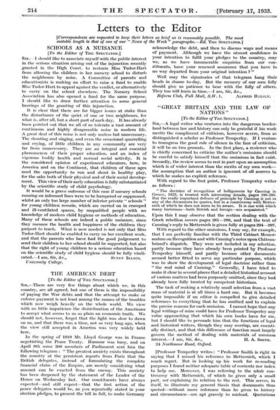THE AMERICAN DEBT
[To th.e Editor of TIIE SPECTATOR.] a,—There are very few things about which we, in this country, are all agreed, but one of them is the impossibility of paying the War debts and that the attempt to make or enforce payment is not least among the causes of the troubles which now weigh heavily on the whole world. We view with no little impatience the disiriclination of the Americans to accept what seems to us so plain an economic truth. We should not, however, forget that the light was slow to dawn on us, and that there was a time, not so very long ago, when the view still accepted in America was very widely held here.
In the spring of 1919 Mr. Lloyd George was in France negotiating the Peace Treaty. Rumour was busy, and on April 9th some 300 members of Parliament sent him the following telegram : "The greatest anxiety exists throughout the country at the persistent reports from Paris that the British delegates, instead of formulating the complete financial claim of the Empire, are merely considering what amount can be exacted from the enemy. This anxiety has been deepened by the statement of the Leader of the House on Wednesday last. Our constituents have always expected—and still expect—that the first action of the peace delegates would be, as you repeatedly stated in your election pledges, to present the bill in full, to make Germany
acknowledge the debt, and then to discuss ways and means of payment. Although we have the utmost confidence in your intention to fulfil your pledges to the country, may we, as we have innumerable enquiries from our con- stituents, have your renewed assurance that you have in no way departed from your original intention ? "
Well may the signatories of that telegram hang their heads in shame to-day. But the memory of our own folly should give us patience to bear with the folly of others. They too will learn in time.—! am, Sir, &e.,
Reform Club, Pall Mall, S.W.1. ALFRED BEESLY.






































 Previous page
Previous page